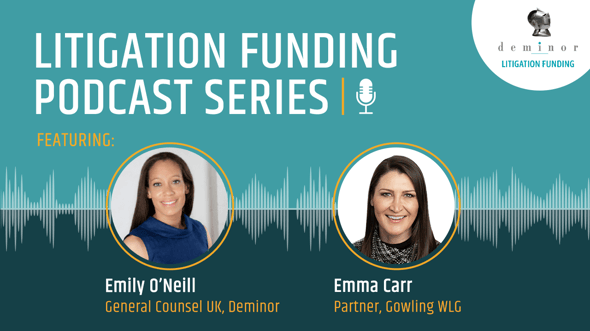In this podcast series, Emily O'Neill General Counsel UK for Deminor Litigation Funding, undertakes interviews with global professionals to discuss different aspects of the litigation funding process. We have already considered the importance of the client in litigation funding as well as the business case for funding.
Deminor welcomes you to join this conversation as we summarise the key elements of the conversations between Emily O'Neill and these experts, as captured in the podcast transcripts below.
Podcast Preface:
Deminor General Counsel UK, Emily O'Neill (EON), speaks with Emma Carr, Commercial Litigation and Litigation Funding Partner at Gowling WLG.
In this interview with Emily, Emma considers the recent decisions relevant to the litigation funding market and how those decisions could shape the market in England and Wales going forward.
Podcast Transcript:
EON – There are multiple articles around the impact of PACCAR on litigation funding. To start us off, please could you briefly describe what the judgement was about?
EC – Like any good lawyer worth their salt, I'll start with a caveat! The PACCAR judgement is a lengthy and detailed exercise in statutory interpretation. It actually runs to 98 pages and it's not unanimous. In fact, two thirds of the judgment is taken up with Lady Rose's dissenting judgment. And so, I'll try and summarise that. It's no mean feat, but with that caveat in mind, I'll have a go.
Essentially, PACCAR arose in the context of collective proceedings in the Competition Appeals Tribunal, the “CAT”. There you had a number of claimants who'd grouped together to apply for a collective proceedings order, so as to allow them to bring a collective claim on behalf of those who'd acquired trucks from manufacturers who'd previously been found to have infringed competition law. Now, as you know, in order to obtain a collective proceedings order, claimants need to show that they have adequate litigation funding arrangements in place in order to meet their own cost liability, as well as any adverse costs order which might be made against them. In this case, the claimants relied on litigation funding agreements (“LFAs”) that they'd entered into, which provided for the funders' return to be calculated by reference to a percentage of the damages recovered.
It was on that basis that the truck manufacturers opposed the collective proceedings orders. What they said was that the funding arrangements the claimants had in place weren't actually enforceable and therefore weren't adequate. They argued that what the funder, were actually doing was providing financial services to the claimants with the effect that they fell within the definition of “claims management services” as defined in the Compensation Act 2006. Therefore, the LFAs were actually Damages Based Agreements “DBAs” within the meaning of section 58 AA of the Courts and Legal Services Act 1990, and were therefore unenforceable. Now, the Supreme Court ultimately agreed with the manufacturers and held that the words ‘claims management services’, when read according to their natural meaning, were indeed capable of covering LFAs. So, the Supreme Court found, therefore, that LFAs which provided for a funder to receive a percentage of damages recovered, were actually DBAs which are not only unenforceable in the context of opt-out collective proceedings, but in fact will only be enforceable in any proceedings to the extent that they comply with the DBA Regulations (SI 2013/609). It was common ground here between the parties that the funding agreements did not so comply.

So, that decision, namely that LFAs which provide for a return based on a percentage of damages, are DBAs came as a bit of a blow to the litigation funding market, particularly for opt-out proceedings in the CAT. Those proceedings are often funded on the basis of a percentage of damages. However, it's also an outcome which, ironically could have been avoided altogether had the amendments which cost Silk Nick Bacon KC and Professor Rachel Mulheron proposed in 2019 been adopted. What their proposals expressly provided for was that an LFA would not be a DBA under the DBA Regs. And so, had their draft amendments come into force back then, then this whole issue in PACCAR, which we're now grappling with, might never have come to pass because it would have been perfectly plain on the face of the legislation that an LFA is not a DBA. Unfortunately, though, that's not where we are currently at, and instead we're having to assess the impact of the funding agreements that are already out there, as well as funding arrangements which might be put together in the future.
Now, in the medium term, it's perhaps inevitable that the regulations will need to be reviewed. And on that front, the Department of Business and Trade has simply said that it is aware of the Supreme Court's decision and is, ”looking at all available options to bring clarity to all interested parties.” So, it's not really clear what that means, whether it means there will be the much-needed legislative intervention or not, and if so, what the reach of that intervention may be, but it's definitely a space that needs to be watched. [1]
[1] We have now heard more from the Department as to its proposed solution in the form of an amendment to the Digital Markets, Competition and Consumers Bill 2022-2023, which was tabled on 15 November. The effect of that proposed amendment, if enacted, would be to remove "claims management services" (the legislative term which the Supreme Court held was wide enough to encompass the provision of pure litigation funding) from the definition of a DBA. However, this would be of limited effect since the amendment (as you may surmise from the title of the bill) would only change the definition of DBA in respect of claims in the CAT and so in practice, this amendment would only regularise the position for one aspect of PACCAR, by allowing the use of DBAs in opt-out collective proceedings. What it won't do is amend the core definition of DBAs in the Courts and Legal Services Act and so without further proposals, LFAs providing for a funder to receive a percentage of damages will effectively remain unenforceable in other proceedings outside of the CAT.
EON – Thanks, Emma. As a funder, watching very closely but are managing our expectations that any changes will come into force ahead of the General Election next year. You said that the judgment was a blow to CAT opt-out proceedings. How are you seeing funders and funded parties structure their transactions or restructure their transactions now, following PACCAR?
EC – I think everybody's approaching it really with caution, and I think it depends how they're restructuring it based on whether it's an LFA which has not yet been entered into or whether it's an existing one. So for new LFAs which have not yet been entered into, then parties are very much erring on that side of caution, like I said, and are first and foremost looking to try and avoid the reach of the DBA Regulations altogether by trying to draft their agreements so they don't come within the ambit of PACCAR at all. For example, by drafting their agreements so that the funder's return is based purely on a multiple of sums invested as opposed to a percentage of damages recovered. Now, another note of caution there. The prevailing view very much seems to be that a multiple only return can be used to avoid the application of the regulations. But, I think one must bear in mind that we're dealing with brand new law here and we could only be one decision away from the courts extending the reach of the DBA Regs. But for now, it certainly seems that the cases which are funded solely on the basis of a multiple of sums invested are to be deemed safe and so this is very much the first port of call for parties with existing LFAs.
Now, where it's not possible, for whatever reason, to base the return purely on the basis of sums invested and parties are able to do so, then they are looking at ways in which they can make their agreements compliant with the notoriously opaque DBA Regs. On that, it is also important to note that some commentators have cast doubt as to whether it will ever be possible to comply with the DBA Regulations, given their uncertainty in drafting, particularly because when they were drafted, they weren't designed to cater for funder LFAs. Given that uncertainty and doubt, we're also seeing some funders take an ultra-cautious approach and draft their agreements so as to be as compliant as possible with the Regulations, but then what they're looking to do is also have a separate backup agreement in place which is based purely on a multiple of sums invested so as to kind of catch the arrangement in the event the primary agreement is found not to comply.

So that's the position for new LFAs. For existing LFAs, we often see a return which is based on a multiple or a percentage of damages, whichever is higher. Now, for those cases, what we're seeing is whether the arrangement can be rescued by the law of severance, so by way of severing the percentage of return part, or alternatively, rescuing it by way of application of the case of Zuberi v Lexlaw., That is a case where the Court of Appeal held that the DBA only constituted the percentage base part of the retainer rather than the retainer as a whole, so presented another way to rescue those alternative fee structures.
And then I suppose the alternative route for current LFAs is for parties to basically look to renegotiate the terms of the LFAs so as to either fall outside of PACCAR by making the return based on a pure multiple of sums invested, or alternatively by way of further amendments so as to ensure the LFA is compliant with the DBA Regs. Now, whether or not that proves possible will, of course, ultimately depend on the negotiating position and power of the parties involved. However, it's unlikely that funders will be willing to advance further funds until an amended or new LFA is agreed, and so that in and of itself may act as a catalyst, if you like, for getting those agreements and amendments across the line.

EON – PACCAR obviously arose in collective proceedings in the CAT, where damages-based agreements, as you've said, are not permitted. But for those kinds of structures, percentages are often used to provide some certainty to class members who wouldn't have day-to-day control over the budget.
I was speaking to Justin Gutmann a couple of weeks ago, and I know that he had a hearing in September 2023 in the Apple batteries case where he was unable to confirm funding agreements because he hadn't been able to agree on amendments to the funding agreement following PACCAR.
Have you seen whether collective funding structures can work and be compliant with PACCAR to give class members more visibility as to what the funder's return is going to look like, but then for the funder to have an agreement that's compliant with PACCAR?
EC – In a word, no. The majority of funding agreements we've seen in the CAT are based on a percentage of damages recovered, which of course, post PACCAR have now been found to be DBAs, which are prohibited by reason of section 47C(8) of the Competition Act 1998, regardless as to whether or not they comply with the DBA Regs. So, it's unclear at this stage how the CAT is going to deal with cases which have already been certified on the strength of LFAs, which have now been rendered unenforceable, or indeed how parties will deal with agreements so as to either take them outside of the scope of PACCAR, or likewise amend them with any degree of ease or economic feasibility. It certainly left many scratching their heads.
You mentioned speaking to Mr. Gutmann. Essentially, the Tribunal chose to park the issue after Mr. Gutmann revealed he'd not yet finalised a new funding agreement post-PACCAR, essentially saying, "I'm still in discussions with funders as to how to comply with the Supreme Court decision". Last month, we also saw claimants propose amendments to their funding agreement in the opt-out action bought by PlayStation customers against Sony. The claimants argued that the amendments to the LFA took the agreement outside of PACCAR, but Sony continues to argue that the LFA still constitutes a DBA. That will be another interesting case to see which argument the court favours there. [2a] Likewise, I also understand there's a settlement of part of the cartel claim being brought in relation to car delivery charges, which is due to be approved in December. It's a settlement, so it needs the approval of the court. And so again, that will be another one to watch to see how far that's impacted by PACCAR, if at all.
However, pending those decisions, as it currently stands, the majority, if not all, of the current opt-out proceedings in the CAT, which obviously involve claims for many millions of pounds, are currently being funded by LFAs. It's believed that the majority of those provide for a percentage return, and obviously, post PACCAR, those LFAs will now be deemed DBAs and, therefore, not permitted. Now, the collective proceedings orders which have already been granted in those cases will no doubt have to be revisited, and funders, if they choose to continue funding, will have to limit their return to a multiple of their investment. While we await the outcome of the imminent decisions, which might help to clarify PACCAR, the potential impact on the decision for claims in the CAT could obviously be huge. And so we expect this to be a significant factor for the government in deciding whether or not to intervene in matters. Given the access to justice to consumers, it's arguably hindering in the meantime.
[2a] We have had a decision from the CAT in Sony where the Tribunal ultimately found for the claimant in agreeing that the revised LFA wording, which based the funder's fee on the greater of a multiple of costs or "only to the extent enforceable and permitted by applicable law, a percentage of the Proceeds" did not fall foul of PACCAR and render the LFA a DBA and therefore unenforceable in the CAT. That decision should therefore, give some comfort to those drafting LFAs that it is still possible to cater for a percentage of recoveries mechanism, albeit a conditional one that must lie dormant unless and until Parliament legislates to make them enforceable – which it appears to be doing, as I said earlier, at least in the case of collective competition actions.

EON – Thinking about other funded structures which use a percentage such as capped law firm CFAs, where the cap is a percentage of the damages, do you think that those types of agreements are now caught by PACCAR and are now DBAs?
EC – Okay, so to be clear, I think this is where you have a CFA which allows for a return by way of an uplift of sums invested, but which then caps or limits the maximum return to a percentage of damages recovered.
In this scenario, you've got a primary cap, which is the multiple of sums invested, but there's this kind of secondary cap which limits the overall return to a percentage of damages. So essentially, what you've got really is kind of a cap within a cap. Now, we've not yet seen one of those types of arrangements being challenged, but I think there is a real concern in the industry that those types of agreements could also now be caught by PACCAR and the Court and Legal Services Act. Now, you can immediately see how that interpretation just cannot be right because, I mean, I suppose: (1) the secondary cap is not the primary means of determining the return. The true cap is the multiple of sums invested; (2) the percentage of damages cap is ultimately a backstop. It's a secondary form of protection for the funded client. And so, why would a court not look to enforce that protection for the client? And (3) there's already a precedent for such secondary caps. They already exist in relation to CFAs relating to personal injury claims, for example, where their sums are positively required to be capped at 25% of the damages received.

EON – So, PACCAR has rendered litigation funding agreements which have their return calculated by way of percentage of damages unenforceable. What does that mean for the parties and the agreements themselves?
EC – Another tricky one which has caused much speculation and discussion in the industry, but one which I ultimately think is where you've got a risk of unenforceability prevailing both for ongoing and historical LFAs, which are based on a percentage of damages. So, the risk with those historical and ongoing LFAs is that those being funded may actually be entitled to keep all of the sums ultimately recovered and may seek to claw back recoveries which might have already been paid to funders pursuant to those unenforceable LFAs. We've actually had a very recent decision, albeit not in the specific context of DBAs but relating to law firm CFAs, that illustrates the potential consequences of having an unenforceable funding agreement.
On October 4th 2023, the Court of Appeal handed down its judgement in the decision of Diag Human SE v Volterra Fietta. That case concerned a CFA as opposed to a DBA, which did not comply with the relevant CFA regulations. But I think helpful or rather unhelpful analogies can be drawn with that case. In that decision, the Court of Appeal held that, “the agreement as a whole was unenforceable because it was a non-compliant CFA.” The court held that the solicitors could not sever the offending parts from the CFA, they could not recover their fees on an alternative quantum merit basis, and they had to repay their clients' sums, which had already been paid under the unenforceable CFA. So in that case, unenforceable meant not just a prospective effect for any further sums due under the agreement, but also necessitated repaying the client $1.5 million, which had already been paid pursuant to that unenforceable CFA. The court said there that it would be contrary to public policy to allow the law firm to recover fees on the basis of an unjust enrichment claim, and that, “equity will not step in to relieve solicitors from the consequences of providing services pursuant to an unlawful agreement which they are precluded from enforcing.”
Now, whilst that case did not apply to DBAs or to litigation funders per se, we can certainly see by analogy how this case will be an unhelpful judgement for funders, and so, therefore, increases the need to ensure enforceability. On the same lines, there's been a recently filed case against funders Therium and Omni Bridgeway [3], where you've got the claimant seeking a declaration that its LFA falls under the PACCAR regime, with the result that no sums should, therefore be due to funders and again, it will also be interesting to see how that case plays out in setting a precedent for the implication for unenforceable LFAs going forward.
[3] On 20 October 2023, the Commercial Court handed down an asset preservation order pursuant to an award made to Bugsby Properties following successful litigation funded by Therium Litigation Funding and Omni Bridgeway [2023] EWHC 2627. Bugsby Properties responded by issuing proceedings against the funders that the LFA was unenforceable.

EON – For the CFA case, do you think that the decision would be different if it had been a DBA and a funder where funders had provided money? Would there be some sort of offset in respect of the repayment back to the client?
EC – I'm not sure I can immediately see where they draw the distinction. I mean, you're right, obviously this involved solicitors, and so whether they were held to a higher standard of account or not, I don't know, but I can't immediately see how the distinctions would be drawn. But as I said, this case did involve CFAs as opposed to DBAs, and, as you pointed out, to a law firm rather than a funder. It is possible that distinctions may be drawn in the future. It's not immediately apparent to me how though. I think, you know, the challenge for the declaration that's currently been sought against Therium and Omni Bridgeway will be interesting to see how that pans out in terms of setting a precedent for the kind of DBA regime.
EON – Definitely. I think just picking up on that, so many reports suggest that PACCAR is fatal for the litigation funding industry. Have you seen any changes in the funding market from the funders that you work with following PACCAR?
EC – Not really. I mean, funding, in my view, is going to continue. There's lots of different reports as to whether this is a ripple, a wave, a tsunami for the litigation funding industry, but I don't think it spells the end for litigation funding. Perhaps if it had happened 15 years or more ago in a fledgling market, then it might have been more damaging. But what we now have, of course, is a well-established litigation funding market, which is sophisticated and involves significant players. So I suppose what we've seen is a lot more funders considering their arrangements in light of the judgment and trying to find ways to still fund within the existing regime. It's caused more of a distraction and an element of uncertainty rather than a kind of fatal halt. It's also clear from what the government have said that they've heard the concerns, and my money is on them, being likely to legislate in the future to try and regulate the position. And admittedly, that may take the government longer than many in the industry would like them to and so there'll have to be these workarounds in the meantime, which is obviously causing the funding market to reflect and adapt its LFAs accordingly.
But I do think that statutory intervention will ultimately come, which will ultimately help regulate the position and bring that clarity. So I don't think it's fatal. I think it's caused a bit of a bloody nose for those in the litigation funding industry in terms of causing this disruption and this hiccup. But I think those injuries will ultimately heal with workarounds, an adaptive funding industry, and expected future government intervention.
It's going to be really interesting because I think there's a couple of cases in the towards the end of the year, certainly which will need to deal with PACCAR questions. I think December has been marked as being quite a key month, and it'll be interesting to see how these play out because until some of them start going through the court system, we're just not going to see that reach and how far PACCAR extends and what workarounds there may be. And I think I listened to Mr Gutmann, and obviously, I've seen what he said in Apple, but the court kind of acknowledged it and just went, "Yeah, OK, we'll deal with everything else, and we'll come back to that",. So, I think everyone acknowledges it needs to be dealt with. People are still kind of scrabbling around, trying to figure out ways. I think in the Sony case as well; they tried to come up with a workaround that said, insofar as allowed or permitted under law. So it'll be interesting to see whether that workaround passes muster or not. Sony certainly didn't think so, but I think that judgment is due out imminently.[2b]
EON – I agree. I think what everyone needs is some certainty as to what can and can't happen. Then we can just move forward or not.
EC – I think it's helpful with having the main impact in the CAT, because it's affecting those consumers that would otherwise have no redress. And so you've got a real public policy kind of wind behind you on those. I know the government statement wasn't particularly instructive in what they were doing, but they are looking at it, and I do think something will have to follow, not least because of that public policy rationale.
[2b] We have had a decision from the CAT in Sony where the Tribunal ultimately found for the claimant in agreeing that the revised LFA wording, which based the funder's fee on the greater of a multiple of costs or "only to the extent enforceable and permitted by applicable law, a percentage of the Proceeds" did not fall foul of PACCAR and render the LFA a DBA and therefore unenforceable in the CAT. That decision should, therefore give some comfort to those drafting LFAs that it is still possible to cater for a percentage of recoveries mechanism, albeit a conditional one that must lie dormant unless and until Parliament legislates to make them enforceable – which it appears to be doing, as I said earlier, at least in the case of collective competition actions.

Litigation Funding Podcast Series - Next Steps and Further Information:
Thanks for joining Deminor's Litigation Funding Podcast Series as we dive deep into core topics in funding litigation.
Keep a lookout for our upcoming conversations as Deminor General Counsel UK, Emily O'Neill, speaks with several more experts to get their insights into different aspects of litigation funding.
If you would like to connect with either Emily or Emma on LinkedIn, please click on the links below:
Emily O'Neill – Deminor General Counsel UK and Global IP lead
Emma Carr – Partner at Gowling WLG
***
Further Reading:
- https://www.deminor.com/en/case-studies/co-funder-proposes-sharing-of-litigation-funding-risk-to-leverage-deminors-in-house-due-diligence-capability
- https://www.deminor.com/en/case-studies/financing-assertion-of-patents-protecting-manufacturing-processes
- https://www.deminor.com/en/case-studies/telecoms-patent-assertion-multi-jurisdictional-campaigns
- https://www.deminor.com/en/case-studies/canadian-innovative-start-up-preparing-for-a-david-v-goliath-litigation-funding-battle
- https://www.deminor.com/en/case-studies/whats-the-risk-assessing-the-risk-of-counter-assertion-by-the-defendant-in-patent-litigation
- https://www.deminor.com/en/case-studies/overstepping-the-mark-litigation-funding-trade-mark-infringement
- https://www.deminor.com/en/case-studies/lights-camera-action-recovering-damages-for-infringement-of-rights-in-a-short-film
- https://www.deminor.com/en/case-studies/recovering-damages-for-stolen-software-through-litigation-funding
- https://www.deminor.com/en/case-studies/funding-in-the-pharma-sector-/-investing-in-a-case-where-litigation-is-already-ongoing

Written on December 22, 2023 by
Deminor
Deminor helps businesses and investors monetise legal claims.






